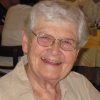Maryknoll Sister who served the poorest people brings their concerns to the United Nations
When Sister Claris Zwareva, a nurse who was born in Zimbabwe, joined the Maryknoll Sisters in 1984, her dream was to serve the poor beyond her own borders. Today she is more than fulfilling that dream as the Maryknoll Sisters’ representative at the United Nations in New York City. There she is among many who, she says, are “the eyes and ears of the poor of the world, looking for opportunities to bring their voices to those who make the policies.”
Since 1998 the Maryknoll Sisters and the Maryknoll Fathers and Brothers, like 1,700 other non-governmental organizations (NGOs), have had special consultative status with the U.N. Economic and Social Council (ECOSOC), one of the six main organs of the United Nations. These NGOs have the right to send representatives or written statements to influence ECOSOC meetings, which focus on issues such as social development, sustainable development, and the status of women and children’s rights. Because of the importance of bringing issues that impact the world’s most vulnerable people to the attention of international policymakers, Maryknoll has seen to it that personnel with years of mission experience maintain their presence at the United Nations.
Sister Zwareva is amply qualified for the job. Her first overseas mission assignment in 1987 took her to Bolivia, which, she says, had one of the highest poverty and mortality rates in Latin America. Her ministry included outreach, sponsored by the Catholic relief agency CARITAS, which provided food for poor mothers and offered them basic health care and training. She recalls climbing up the mountainsides of the bowl-like city of La Paz looking for those who needed care. “Too many young children and mothers died so young there,” she says. “Many just couldn’t afford the medicine or were afraid of going to a doctor or hospital. I had to search them out.” She found children in the soup kitchen grateful for a hot meal who, in turn, referred her to other hungry children, and mothers standing in long lines at the outpatient clinic waiting for medical treatment for their little ones. One of her most heartbreaking memories is of the death of her Aymara helper, Isabel, who died of anemia while giving birth to her first child. Such experiences expanded Sister Zwareva’s mind and heart to address the plight of the poor and alleviate their suffering.
She was then appointed administrative secretary for the Institute of Bioethics at the Catholic University of Bolivia. “There I saw the need to integrate bioethics as an academic subject in schools, particularly in today’s world, threatened by AIDS and poverty,” she says. Because bioethics views medical issues in the light of morality, social justice and peace, she says, it touches every aspect of life. “Since our foundation, the Maryknoll Sisters have focused on ministries that promote peace, justice and the integrity of creation,” says Sister Zwareva. “This task is even more crucial today because of deforestation, the over-exploitation of Earth’s resources and wildlife as well as pollution of water, air and soil.”
After earning a bachelor’s degree in biology and master’s degree in bioethics, Sister Zwareva was delighted when in 2013 she was asked by the Maryknoll Sisters to bring her mission experience and educational background to the United Nations. This ministry entails working closely with the Maryknoll Office for Global Concerns in Washington, D.C., staffed by other Maryknoll members and laity, who bring to U.S. lawmakers the concerns of the people Maryknoll serves worldwide.
It also entails working with representatives of the more than 70 congregations of women and men religious who also participate at the United Nations as NGOs. These congregations representing 153 countries play an important role in reporting what is happening on the ground. Their consistent messages, says Sister Zwareva, include: “Put people and earth first.” “Water, food and air are human rights.” “Human trafficking as well as wild life trafficking must be abolished.”
Before attending the U.N. Climate Change Conference, COP 21 (Conference of Parties) in Paris as an observer in December, she said, “Issues on climate change are important to us today in our mission endeavors and it is important for us to be there to ensure transparency in the negotiations.”
She finds encouragement in Pope Francis’ encyclical Laudato Si’ and in his address to the United Nations last September, where, she says, he urgently appealed not only to Catholics but to the whole human family to come together in dialogue to confront the grave implications of pollution, wars, climate change, the depletion of natural resources and clean water, the loss of biodiversity and so much more self-inflicted destruction of the earth, “our common home.”
For missioners like Sister Claris, Pope Francis’ message is a confirmation of their ministries: “Everything is connected. Concern for the environment needs to be joined to a sincere love for our fellow human beings and an unwavering commitment to resolving the problems of society.”
Featured Image: Maryknoll Sister Claris Zwareva seeks ways to bring the voice of the voiceless to policymakers at the U.N.(Courtesy of C. Zwareva/U.S.)

